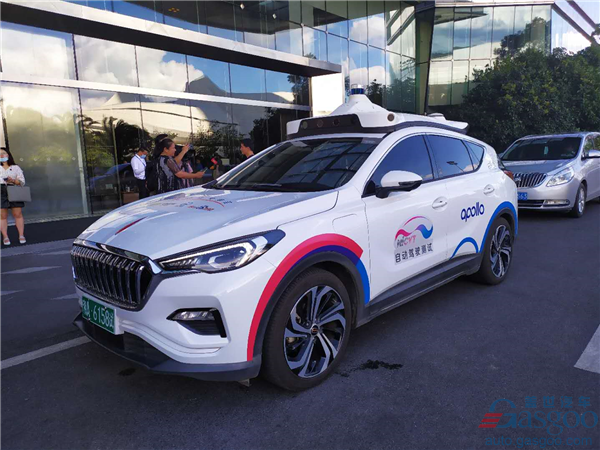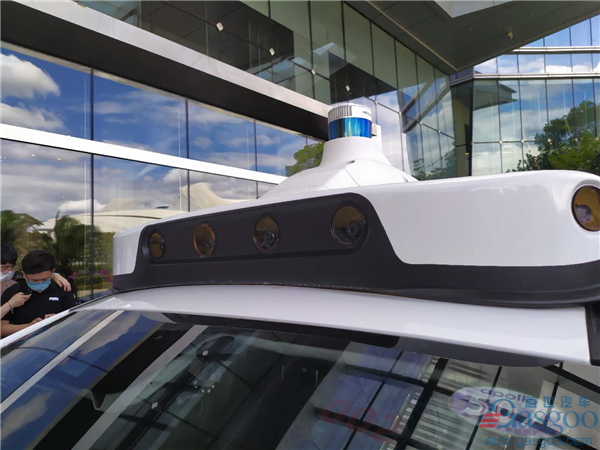Baidu Apollo Robotaxi deployed in Changsha offers “considerate” riding experience
Shanghai (Gasgoo)- Chinese Internet giant Baidu recently invited a number of reporters from international media outlets to have test rides of its Robotaxi service operated in Changsha, Hunan province. As one of those invited, Gasgoo experienced on August 6 this high technology which has already been completely open to local residents.
Before telling you what I saw and felt on the trip, it is necessary to briefly introduce how Apollo Robotaxi has developed as of today.
Baidu Apollo has grown into the world's largest autonomous driving open-source platform since Baidu started R&D of the nascent technology in 2013. Up until now, the Apollo has already had a testing fleet of around 500 vehicles with over 6 million-km testing mileage, and has received more than 150 licenses for road tests, around 120 of which make passenger-carrying eligible.

In 2019, Baidu and FAW Hongqi jointly developed the Hongqi-branded Robotaxi EV, China's first-of-its-kind factory-installed mass-produced L4 autonomous car. Baidu said it marks Apollo's last achievement in the iteration of its autonomous driving technologies, boasting all-round improvements in software & hardware, factory-installation capabilities, in-house human-machine interaction system, security redundancy guarantee, cloud-based fleet management, and other areas. Moreover, the Hongqi EV is equipped with customized Apollo OBU (on-board unit), which can perform L4 V2X (vehicle-to-everything) collaborative sensing driving by virtue of intelligent-connected roadside facilities.
As of now, Apollo has already launched the trial service of Robotaxi in Changsha with a fleet of 45 vehicles deployed. Operations in Beijing and Cangzhou are still in the seed user stage with 40 and 30 autonomous cars running on roads respectively. In addition, the testing driving has also been carried out in an additional 21 cities, including Chongqing and Wuhan.

In Changsha, where we had the magical ride on spot, the Robotaxi operation has been developing fast. The milestones are shown as below:
On June 21, 2019, Changsha municipal government issued 49 license plates for autonomous car road tests, of which 45 were given to Baidu. According to the policy released at the same day, applicants were allowed to test autonomous vehicles on expressways or with passengers carried, which meant Baidu Apollo's Robotaxi would ferry passengers soon.
On August 2, 2019, Robotaxi-Hongqi E·Jie, China's first mass-produced L4 self-driving taxi co-developed by Baidu and FAW Hongqi, was put into test drives in Changsha.
On September 26, 2019, Baidu announced in Changsha the beginning of trial operations of its self-driving Robotaxi fleet. From then on, local citizens can apply via Apollo's official website to be among the earliest seed users to have test rides.
On April 19, 2020, Baidu stated that it kicked off the full operation of the Apollo Robotaxi service, which enables Changsha users to get a free test ride through one click on Baidu Maps or the “Dutaxi” smart mini program embedded in the Baidu App.

(Photo source: Baidu)
The Apollo Robotaxis can run along designated routes that span 135km in total which covers ample social scenarios like business districts, schools, industrial parks and residential areas. Most of the routes are located at Meixihu Subdistrict of Changsha's Yuelu District.
The operation is permitted to be conducted between 9:20 a.m. and 4:40 p.m. per day, excluding holidays. Every Robotaxi can accommodate up to two passengers at the back seat. In accordance with the current regulations, a safety driver and a so-called “navigator” should sit at the front to ensure safe driving, record issues and answer passengers' queries.

A passenger between the age of 18 and 65 can hail an Apollo Robotaxi through the Baidu Maps app or Baidu App's “Dutaxi” smart mini program after inputting the ID information and selecting the departure and destination spots from close to 100 given options. Unlike the traditional taxi ride, the passenger cannot change his destination during the Robotaxi trip.
For the sake of pandemic control and prevention, passengers are required to wear facial masks during the trip. A smart AI-powered temperature screening device is installed to measure passengers’ body temperature before they get into the car.
After getting myself buckled up, I was told to reconfirm my ID information and tap the “start journey” button on the touchscreen that exactly faces me. The two screens right behind the front seats are one of highlights I will introduce later.

(Photo source: Gasgoo)
To be honest, the whole travelling experience was quite beyond my expectation and even made me forget at some moment that the safety officer’s hands were totally off the steering wheel. The vehicle was running at a steady speed rate under 50km/h required by local regulations. Like a normal taxi controlled by a human driver, the Apollo Robotaxi is able to change lanes as appropriate, lower speed to avoid pedestrians and the vehicles that intend to overtake from a close distance, fend obstacles off and make a turn.

According to Baidu, the Apollo Robotaxi adopts a multi-sensor solution consisting of LiDARs, millimeter-wave radars and cameras. If it merely relys on the car-borne sensors, the road conditions beyond the sensors' detection range are out of reach. However, I still was informed of such information as vehicle numbers, the countdown of traffic light timers, road works and road occupations ahead where the in-car sensors cannot detect. The “clairvoyance” effect is made possible primarily by the V2X (vehicle-to-everything) system along roads composed of RSU (roadside unit), edge computing units, intelligent traffic lights, roadside sensors, and other facilities.
Aside from supporting the Robotaxi operation, the V2X system can also benefit normal vehicles equipped with connected system, so as to cut the urban traffic management cost and enhance the transport efficiency for the whole city, said the navigator.

(Photo source: Baidu)
Compared to other developers who put much more weight on the intelligence level of single vehicle, Baidu has adopted a different technical approach—the vehicle-infrastructure cooperative system. As Li Zhenyu, Corporate Vice President of Baidu and General Manager of its Intelligent Driving Group, said in an internal e-mail released in April, Baidu believes that the vehicle-infrastructure cooperative system solution will reduce the cost of developing a single autonomous car and offer greater safety redundancy guarantee.

The aforesaid touchscreens are designed to offer passengers considerate human-machine interaction experience. Apart from displaying the road conditions detected by sensors and smart roadside infrastructures, it allows passengers to change the interface display as they prefer and play music offered by NetEase Music, a freemium music streaming service developed and owned by NetEase, Inc., to make the trip more relaxing and cheerful.
What passengers think of the Robotaxi service is of particular concern to Baidu. Responding to a request from Gasgoo, the company said in a written statement that the number of daily rides of an Apollo Robotaxi has been close to that of a normal vehicle for ride-hailing service on average, which signifies that the Apollo Robotaxi is highly received by the local public who are confident in the safety of autonomous cars. Passengers who take an Apollo Robotaxi will find the experience similar to that of a human-manipulated taxi and that the vehicle strictly abides by traffic regulations.
Gasgoo not only offers timely news and profound insight about China auto industry, but also help with business connection and expansion for suppliers and purchasers via multiple channels and methods. Buyer service:buyer-support@gasgoo.comSeller Service:seller-support@gasgoo.com







